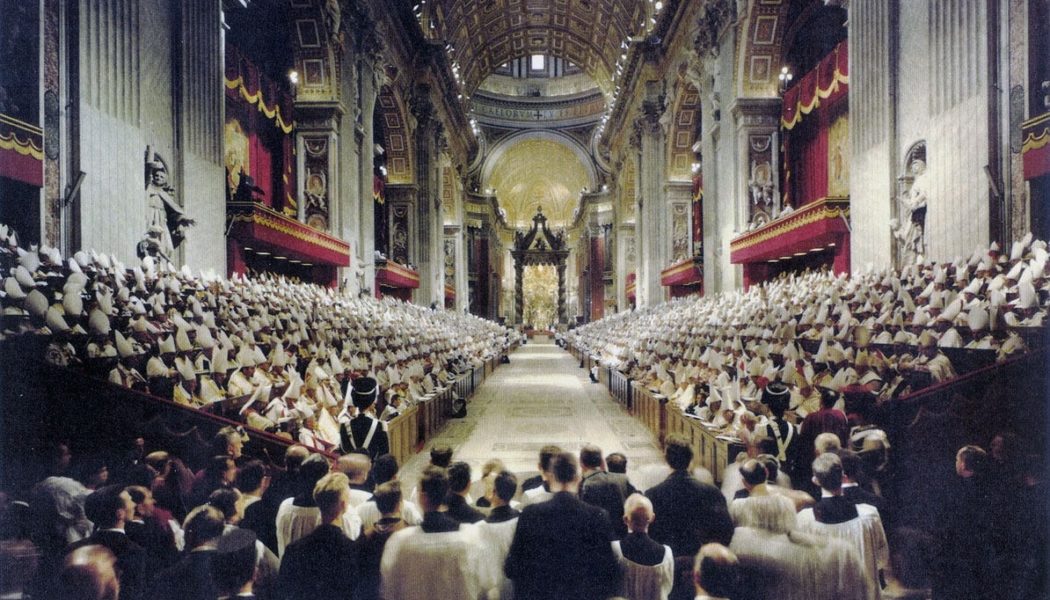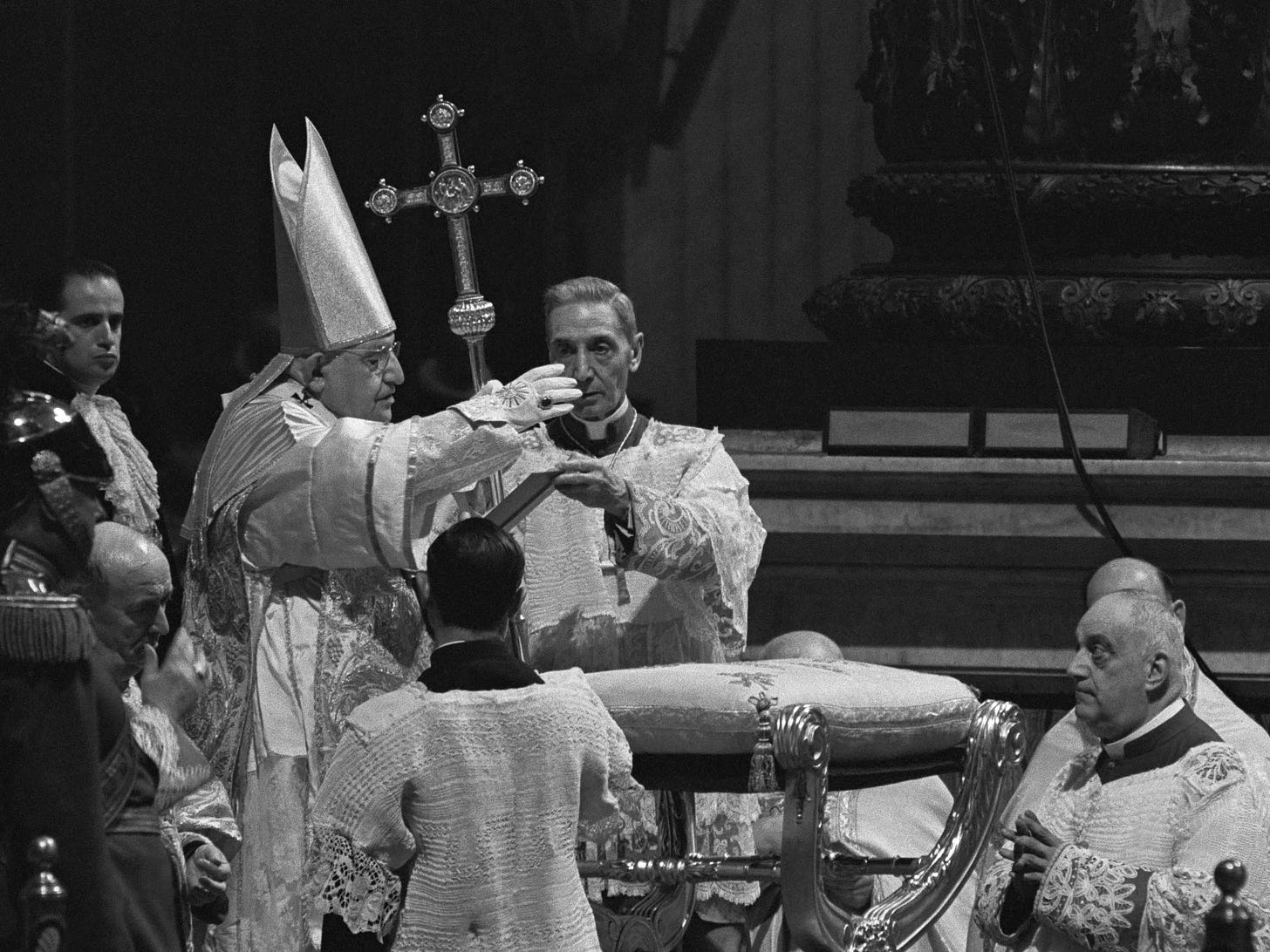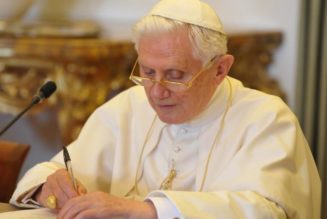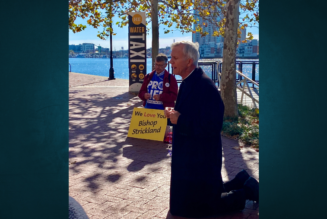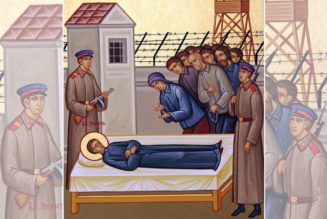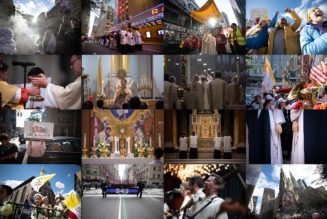A quick note: I unfortunately will be a bit out-of-pocket these next few weeks while traveling with my young family, so I will post here when I’m able. Since today marks the 60th anniversary of the opening of the Second Vatican Council, the words of “Good Pope John” – Pope St. John XXIII – thankfully will more than suffice.
Today in Papal History marks the 60th anniversary of the opening of the Second Vatican Council, the 21st ecumenical council in the history of the Catholic Church. Drawing together all of the bishops of the world, Pope John XXIII gave his opening remarks to a crowded St. Peter’s Basilica, kicking off the great event that had two future popes – St. John Paul II and Pope Emeritus Benedict XVI – as some of its key influences.
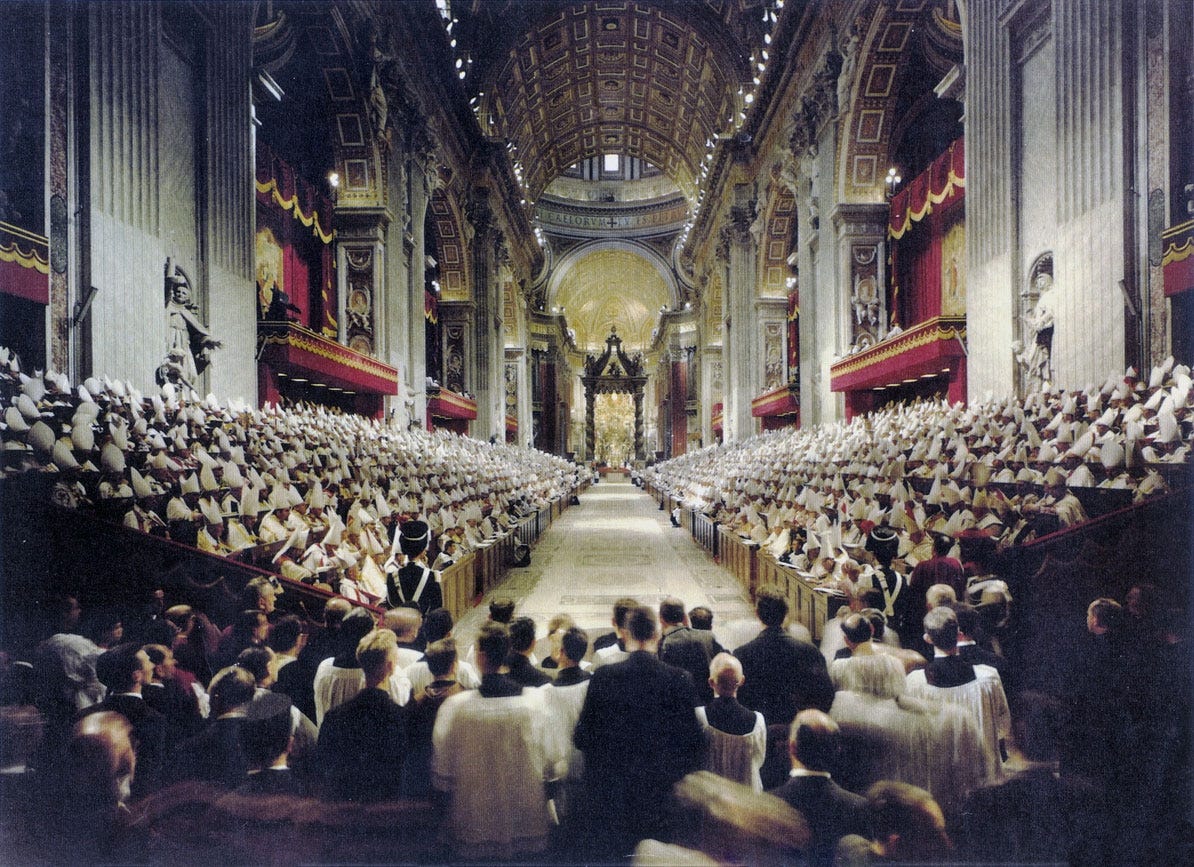
by Pope St. John XXIII
Today, Venerable Brethren, is a day of joy for Mother Church: through God’s most kindly providence the longed-for day has dawned for the solemn opening of the Second Vatican Ecumenical Council, here at St. Peter’s shrine. And Mary, God’s Virgin Mother, on this feast day of her noble motherhood, gives it her gracious protection.
A positive proof of the Catholic Church’s vitality is furnished by every single council held in the long course of the centuries—by the twenty ecumenical councils as well as by the many thousands of memorable regional and provincial ones emblazoned on the scroll of history.
And now the Church must once more reaffirm that teaching authority of hers which never fails, but will endure until the end of time. For that was Our reason for calling this most authoritative assembly, and We address you now as the humble successor, the latest born, of this Prince of Apostles. The present Council is a special, worldwide manifestation by the Church of her teaching office, exercised in taking account of the errors, needs and opportunities of our day.
A History Of Triumph …
We address you, therefore, as Christ’s vicar, and We naturally begin this General Council by setting it in its historical context. The voice of the past is both spirited and heartening. We remember with joy those early popes and their more recent successors to whom we owe so much. Their hallowed, momentous words come down to us through the councils held in both the East and the West, from the fourth century to the Middle Ages, and right down to modern times. Their uninterrupted witness, so zealously given, proclaims the triumph of Christ’s Church, that divine and human society which derives from its divine Redeemer its title, its gifts of grace, its whole dynamic force.
… And Of Adversity
Here is cause indeed for spiritual joy. And yet this history has its darker side too, a fact, which cannot be glossed over. These nineteen hundred years have reaped their harvest of sorrow and bitterness. The aged Simeon’s prophecy to Mary, the Mother of Jesus, proves true in every age: “Behold, this child is destined for the fall and for the rise of many in Israel, and for a sign that shall be contradicted.” 1 Jesus, too, when grown to manhood, made it quite clear that men in times to come would oppose Him. We remember those mysterious words of His: “He who hears you, hears me.” 2 St. Luke, who records these words, also quotes Him later as saying: “He who is not with me is against me; and he who does not gather with me scatters.” 3
To Be With Christ Of Against Him
Certain it is that the critical issues, the thorny problems that wait upon men’s solution, have remained the same for almost twenty centuries. And why? Because the whole of history and of life hinges on the person of Jesus Christ. Either men anchor themselves on Him and His Church, and thus enjoy the blessings of light and joy, right order and peace; or they live their lives apart from Him; many positively oppose Him, and deliberately exclude themselves from the Church. The result can only be confusion in their lives, bitterness in their relations with one another, and the savage threat of war.
A Pastoral Function
But the function of every ecumenical council has always been to make a solemn proclamation of the union that exists between Christ and His Church; to diffuse the light of truth; to give right guidance to men both as individuals and as members of a family and a society; to evoke and strengthen their spiritual resources; and to set their minds continually on those higher values which are genuine and unfailing.
No study of human history during these twenty centuries of Christendom can fail to take note of the evidence of this extraordinary teaching authority of the Church as voiced in her general councils. The documents are there, whole volumes of them; a sacred heritage housed in the Roman archives and in the most famous libraries of the world.
A Sudden Inspiration
As regards the immediate cause for this great event, which gathers you here together at Our bidding, it is sufficient for Us to put on record once more something which, though trifling in itself, made a deep impression on Us personally. The decision to hold an ecumenical council came to Us in the first instance in a sudden flash of inspiration. We communicated this decision, without elaboration, to the Sacred College of Cardinals on that memorable January 25, 1959, the feast of St. Paul’s Conversion, in his patriarchal basilica in the Ostien Way. 4 The response was immediate. It was as though some ray of supernatural light had entered the minds of all present: it was reflected in their faces; it shone from their eyes. At once the world was swept by a wave of enthusiasm, and men everywhere began to wait eagerly for the celebration of this Council.
Arduous Preparation
For three years the arduous work of preparation continued. It consisted in making a detailed and accurate analysis of the prevailing condition of the faith, the religious practice, and the vitality of the Christian, and particularly the Catholic, body.
We are convinced that the time spent in preparing for this Ecumenical Council was in itself an initial token of grace, a gift from heaven.
Hope For Spiritual Enrichment
For We have every confidence that the Church, in the light of this Council, will gain in spiritual riches. New sources of energy will be opened to her, enabling her to face the future without fear. By introducing timely changes and a prudent system of mutual cooperation, We intend that the Church shall really succeed in bringing men, families and nations to the appreciation of supernatural values.
Thus the celebration of this Council becomes a compelling motive for whole-hearted thanksgiving to God, the giver of every good gift, and for exultantly proclaiming the glory of Christ the Lord, the triumphant and immortal King of ages and peoples.
And now, venerable brethren, there is another point that We would have you consider. Quite apart from the spiritual joy we all feel at this solemn moment of history, the very circumstances in which this Council is opening are supremely propitious. May We go on record as expressing this conviction openly before you now in full assembly.
Pessimistic Voices
In the daily exercise of Our pastoral office, it sometimes happens that We hear certain opinions which disturb Us—opinions expressed by people who, though fired with a commendable zeal for religion, are lacking in sufficient prudence and judgment in their evaluation of events. They can see nothing but calamity and disaster in the present state of the world. They say over and over that this modern age of ours, in comparison with past ages, is definitely deteriorating. One would think from their attitude that history, that great teacher of life, had taught them nothing. They seem to imagine that in the days of the earlier councils everything was as it should be so far as doctrine and morality and the Church’s rightful liberty were concerned.
We feel that We must disagree with these prophets of doom, who are always forecasting worse disasters, as though the end of the world were at hand.
A Basis For Optimism
Present indications are that the human family is on the threshold of a new era. We must recognize here the hand of God, who, as the years roll by, is ever directing men’s efforts, whether they realize it or not, towards the fulfillment of the inscrutable designs of His providence, wisely arranging everything, even adverse human fortune, for the Church’s good.
Civil Intervention Eliminated
As a simple example of what We mean, consider the extremely critical problems which exist today in the political and economic spheres. Men are so worried by these things that they give scant thought to those religious concerns, which are the province of the Church’s teaching authority. All this is evil, and we are right to condemn it. But this new state of affairs has at least one undeniable advantage: it has eliminated the innumerable obstacles erected by worldly men to impede the Church’s freedom of action. We have only to take a cursory glance through the annals of the Church to realize that even those ecumenical councils which are recorded there in letters of gold, were celebrated in the midst of serious difficulties and most distressing circumstances, through the unwarranted intervention of the civil authority. Such intervention was sometimes dictated by a sincere intention on the part of the secular princes to protect the Church’s interests, but more often than not their motives were purely political and selfish, and the resultant situation was fraught with spiritual disadvantage and danger.
Earnest Prayer For Absent Bishops
We must indeed confess to you Our deep sorrow over the fact that so many bishops are missing today from your midst. They suffer imprisonment and every kind of disability because of their faith in Christ. The thought of these dear brothers of Ours impels Us to pray for them with great earnestness. Yet We are not without hope; and We have the immense consolation of knowing that the Church, freed at last from the worldly fetters that trammelled her in past ages, can through you raise her majestic and solemn voice from this Vatican Basilica, as from a second Apostolic Cenacle.
The major interest of the Ecumenical Council is this: that the sacred heritage of Christian truth be safeguarded and expounded with greater efficacy.
That doctrine embraces the whole man, body and soul. It bids us live as pilgrims here on earth, as we journey onwards towards our heavenly homeland.
Man’s Twofold Obligation
It demonstrates how we must conduct this mortal life of ours. If we are to achieve God’s purpose in our regard we have a twofold obligation: as citizens of earth, and as citizens of heaven. That is to say, all men without exception, both individually and in society, have a life-long obligation to strive after heavenly values through the right use of the things of this earth. These temporal goods must be used in such a way as not to jeopardize eternal happiness.
Seeking The Kingdom Of God
True enough, Christ our Lord said: “Seek first the kingdom of God and His justice,” 5 and this word “first” indicates what the primary direction of all our thoughts and energies must be. Nevertheless, we must not forget the rest of Our Lord’s injunction: “and all these things shall be given you besides.” 6 Thus the traditional as well as the contemporary Christian approach to life is to strive with all zeal for evangelical perfection, and at the same time to contribute toward the material good of humanity. It is from the living example and the charitable enterprise of such Christians as these that all that is highest and noblest in human society takes its strength and growth.
Contributing To Society
If this doctrine is to make its impact on the various spheres of human activity—in private, family and social life—then it is absolutely vital that the Church shall never for an instant lose sight of that sacred patrimony of truth inherited from the Fathers. But it is equally necessary for her to keep up to date with the changing conditions of this modern world, and of modern living, for these have opened up entirely new avenues for the Catholic apostolate.
Beyond Science
The Church has never been stinting in her admiration for the results of man’s inventive genius and scientific progress, which have so revolutionized modern living. But neither has she been backward in assessing these new developments at their true value. While keeping a watchful eye on these things, she has constantly exhorted men to look beyond such visible phenomena—to God, the source of all wisdom and beauty. Her constant fear has been that man, who was commanded to “subject the earth and rule it,” 7 should in the process forget that other serious command: “The Lord thy God shalt thou worship, and Him only shalt thou serve.” 8 Real progress must not be impeded by a passing infatuation for transient things.
From what We have said, the doctrinal role of this present Council is sufficiently clear.
Transmitting The Truth Fearlessly
This twenty-first Ecumenical Council can draw upon the most effective and valued assistance of experts in every branch of sacred science, in the practical sphere of the apostolate, and in administration. Its intention is to give to the world the whole of that doctrine which, notwithstanding every difficulty and contradiction, has become the common heritage of mankind—to transmit it in all its purity, undiluted, undistorted.
It is a treasure of incalculable worth, not indeed coveted by all, but available to all men of good will.
And our duty is not just to guard this treasure, as though it were some museum-piece and we the curators, but earnestly and fearlessly to dedicate ourselves to the work that needs to be done in this modern age of ours, pursuing the path which the Church has followed for almost twenty centuries.
Nor are we here primarily to discuss certain fundamentals of Catholic doctrine, or to restate in greater detail the traditional teaching of the Fathers and of early and more recent theologians. We presume that these things are sufficiently well known and familiar to you all.
A Fresh Approach
There was no need to call a council merely to hold discussions of that nature. What is needed at the present time is a new enthusiasm, a new joy and serenity of mind in the unreserved acceptance by all of the entire Christian faith, without forfeiting that accuracy and precision in its presentation which characterized the proceedings of the Council of Trent and the First Vatican Council. What is needed, and what everyone imbued with a truly Christian, Catholic and apostolic spirit craves today, is that this doctrine shall be more widely known, more deeply understood, and more penetrating in its effects on men’s moral lives. What is needed is that this certain and immutable doctrine, to which the faithful owe obedience, be studied afresh and reformulated in contemporary terms. For this deposit of faith, or truths which are contained in our time-honored teaching is one thing; the manner in which these truths are set forth (with their meaning preserved intact) is something else.
This, then, is what will require our careful, and perhaps too our patient, consideration. We must work out ways and means of expounding these truths in a manner more consistent with a predominantly pastoral view of the Church’s teaching office.
In these days, which mark the beginning of this Second Vatican Council, it is more obvious than ever before that the Lord’s truth is indeed eternal. Human ideologies change. Successive generations give rise to varying errors, and these often vanish as quickly as they came, like mist before the sun.
The Church has always opposed these errors, and often condemned them with the utmost severity. Today, however, Christ’s Bride prefers the balm of mercy to the arm of severity. She believes that, present needs are best served by explaining more fully the purport of her doctrines, rather than by publishing condemnations.
Contemporary Repudiation Of Godlessness
Not that the need to repudiate and guard against erroneous teaching and dangerous ideologies is less today than formerly. But all such error is so manifestly contrary to rightness and goodness, and produces such fatal results, that our contemporaries show every inclination to condemn it of their own accord—especially that way of life which repudiates God and His law, and which places excessive confidence in technical progress and an exclusively material prosperity. It is more and more widely understood that personal dignity and true self-realization are of vital importance and worth every effort to achieve. More important still, experience has at long last taught men that physical violence, armed might, and political domination are no help at all in providing a happy solution to the serious problems which affect them.
A Loving Mother
The great desire, therefore, of the Catholic Church in raising aloft at this Council the torch of truth, is to show herself to the world as the loving mother of all mankind; gentle, patient, and full of tenderness and sympathy for her separated children. To the human race oppressed by so many difficulties, she says what Peter once said to the poor man who begged an alms: “Silver and gold I have none; but what I have, that I give thee. In the name of Jesus Christ of Nazareth, arise and walk.” 9 In other words it is not corruptible wealth, nor the promise of earthly happiness, that the Church offers the world today, but the gifts of divine grace which, since they raise men up to the dignity of being sons of God, are powerful assistance and support for the living of a more fully human life. She unseals the fountains of her life-giving doctrine, so that men, illumined by the light of Christ, will understand their true nature and dignity and purpose. Everywhere, through her children, she extends the frontiers of Christian love, the most powerful means of eradicating the seeds of discord, the most effective means of promoting concord, peace with justice, and universal brotherhood.
The Church’s anxiety to promote and defend truth springs from her conviction that without the assistance of the whole of revealed doctrine man is quite incapable of attaining to that complete and steadfast unanimity which is associated with genuine peace and eternal salvation. For such is God’s plan. He “wishes all men to be saved and to come to the knowledge of the truth.” 10
Unhappily, however, the entire Christian family has not as yet fully and perfectly attained to this visible unity in the truth. But the Catholic Church considers it her duty to work actively for the fulfillment of that great mystery of unity for which Christ prayed so earnestly to His heavenly Father on the eve of His great sacrifice. The knowledge that she is so intimately associated with that prayer is for her an occasion of ineffable peace and joy. And why should she not rejoice sincerely when she sees Christ’s prayer extending its salvific and ever increasing efficacy even over those who are not of her fold?
Reflection Of That Unity Sought By Christ
Indeed, if we consider well the unity for which Christ prayed on behalf of His Church, it would seem to shine, as it were, with a threefold ray of supernatural, saving light. There is first of all that unity of Catholics among themselves which must always be kept steadfast and exemplary. There is also a unity of prayer and ardent longing prompting Christians separated from this Apostolic See to aspire to union with us. And finally there is a unity, which consists in the esteem and respect shown for the Catholic Church by members of various non-Christian religions.
Universality And Unity
It is therefore an overwhelming source of grief to us to know that, although Christ’s blood has redeemed every man that is born into this world, there is still a great part of the human race that does not share in those sources of supernatural grace, which exist in the Catholic Church. And yet the Church sheds her light everywhere. The power that is hers by reason of her supernatural unity redounds to the advantage of the whole family of men. She amply justifies those magnificent words of St. Cyprian: “The Church, radiant with the light of her Lord, sheds her rays over all the world, and that light of hers remains one, though everywhere diffused; her corporate unity is not divided. She spreads her luxuriant branches over all the earth; she sends out her fair-flowing streams ever farther afield. But the head is one; the source is one. She is the one mother of countless generations. And we are her children, born of her, fed with her milk, animated with her breath.” 11
Blazing A Trail
Such, venerable brethren, is the aim of the Second Vatican Council. It musters the Church’s best energies and studies with all earnestness how to have the message of salvation more readily welcomed by men. By that very fact it blazes a trail that leads toward that unity of the human race, which is so necessary if this earthly realm of ours is to conform to the realm of heaven, “whose king is truth, whose law is love, whose duration is eternity.” 12
Thus, venerable brethren in the episcopate, “our heart is wide open to you.” 13 Here we are assembled in this Vatican Basilica at a turning-point in the history of the Church; here at this meeting-place of earth and heaven, by St. Peter’s tomb and the tomb of so many of Our predecessors, whose ashes in this solemn hour seem to thrill in mystic exultation.
A Radiant Dawn
For with the opening of this Council a new day is dawning on the Church, bathing her in radiant splendor. It is yet the dawn, but the sun in its rising has already set our hearts aglow. All around is the fragrance of holiness and joy. Yet there are stars to be seen in this temple, enhancing its magnificence with their brightness. You are those stars, as witness the Apostle John; 14 the churches you represent are golden candlesticks shining round the tomb of the Prince of Apostles. 15 With you We see other dignitaries come to Rome from the five continents to represent their various nations. Their attitude is one of respect and warm-hearted expectation.
Saints, Faithful, And Council Fathers
Hence, it is true to say that the citizens of earth and heaven are united in the celebration of this Council. The role of the saints in heaven is to supervise our labors; the role of the faithful on earth, to offer concerted prayer to God; your role, to show prompt obedience to the supernatural guidance of the Holy Spirit and to do your utmost to answer the needs and expectations of every nation on earth. To do this you will need serenity of mind, a spirit of brotherly concord, moderation in your proposals, dignity in discussion, and wisdom in deliberation.
God grant that your zeal and your labors may abundantly fulfill these aspirations. The eyes of the world are upon you; and all its hopes.
Prayer For Divine Assistance
Almighty God, we have no confidence in our own strength; all our trust is in you. Graciously look down on these Pastors of your Church. Aid their counsels and their legislation with the light of your divine grace. Be pleased to hear the prayers we offer you, united in faith, in voice, in mind.
Mary, help of Christians, help of bishops; recently in your church at Loreto, where We venerated the mystery of the Incarnation, 16 you gave us a special token of your love. Prosper now this work of ours, and by your kindly aid bring it to a happy, successful conclusion. And do you, with St. Joseph your spouse, the holy apostles Peter and Paul, St. John the Baptist and St. John the Evangelist, intercede for us before the throne of God.
To Jesus Christ, our most loving Redeemer, the immortal King of all peoples and all ages, be love, power and glory for ever and ever. Amen.
NOTES:
1 Luke 2, 34.
2 Ibid. 10, 16.
3 Ibid. 11, 23.
4 See pp. 20-23 above.
5 Matt. 6, 33.
6 Ibid.
7 Cf. Gen. 1, 28.
8 Matt. 4, 10; Luke 4, 8.
9 Acts 3, 6.
10 Tim. 2, 4.
11 De Catholicae Ecclesiae Unitate, 5.
12 St. Augustine, Ep. 138, 3.
13 2 Cor. 6, 11.
14 Apoc. 1, 20.
15 Ibid.
16 Cf. TPS, VIII. 273-8.
Join Our Telegram Group : Salvation & Prosperity
